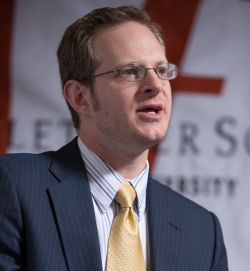Five-Year Updates: Meet Zack Gold, F09
I admit: It’s a little late to be wrapping up Five-Year Updates from the Class of 2009. But when I published the most recent post, I realized that every one of the 2009ers were women. Surely there were men in that class! So I reached out to Zack, an Admissions pal from back in the day, and he zapped his post to me in a jiffy. With no further ado, the final Five-Year Update from the Class of 2009, from Zack Gold.
This is really a six-year update, written from Tel Aviv, where I’m a Visiting Fellow at the Institute for National Security Studies (INSS). My research focuses on the Sinai Peninsula, the Gaza Strip, Egyptian political development, and Egyptian-Israeli-U.S. relations. I’m also an Adjunct Fellow at the American Security Project, which recently hosted me at a conference on Eastern Mediterranean energy security in Washington.
My path to Fletcher developed at the University of Delaware. I was an undergraduate student when the Palestinians launched the Second Intifada against Israel, during the 9/11 attacks, and in the lead up to and start of the Iraq war. Over those years my background in Middle Eastern history and interfaith relations developed into an awareness of and interest in international affairs.
After graduating I worked in Washington for two years at Meridian International Center, where I helped administer the State Department’s International Visitors Leadership Program. In between writing itineraries and booking flights, I tagged along with foreign delegations to meetings at the White House, State Department, and Pentagon. I unselfishly escorted one visitor to see the Baltimore Orioles host the Boston Red Sox: a public diplomacy win for Red Sox Nation!
Before graduate school I wanted to gain a better understanding of the Middle East, so I spent 14 months living, working, and studying languages in Egypt and Israel, while also traveling to Jordan, Morocco, and Turkey. My on-ground experiences over that time have informed my work ever since.
This international worldview made The Fletcher School of Law and Diplomacy an obvious choice. I was extremely impressed with the individuals who made up the Fletcher community, and I took advantage of the flexibility in courses and coursework. In classes on decision-making, statecraft, and public diplomacy, I had the opportunity to develop projects that fit my interests: writing policy briefs, op-eds, and papers; and conducting simulations on politics in Egypt and Pakistan and on the Iranian nuclear program.
I greatly enjoyed the research and writing, not all of which was ground-breaking analysis. The Fletcher School has wisely removed the student-run blog from that time. My most worthwhile contribution probably centered on the best place to get ice cream in the area.
In 2011, two years after earning my MALD, the uprising in Egypt brought two areas of my Fletcher studies back into focus: U.S. democratization policy (about which I wrote a seminar paper) and the Muslim Brotherhood (my thesis: “The Egyptian Muslim Brotherhood: Moderate Islamists, Moderate Democrats”). I began publishing about U.S.-Egyptian relations as an independent analyst, and in May of that year I started a research term at The Brookings Institution’s Saban Center for Middle East Policy (since renamed the Center for Middle East Policy).
My Brookings position was a dream job. For three years I worked directly with the very scholars and practitioners whose books and articles I read at Fletcher. I learned from their experiences and guidance, and I had access to incredible leaders and thinkers around Washington and the Middle East. At the same time, I developed my own subject-matter expertise: looking closely at security in Sinai, where a jihadist insurgency threatens both Egypt and Israel.
In addition to work-related and research travel to the Middle East, and a number of independent publications, I had the privilege of authoring a Brookings analysis paper: “Sinai Security: Opportunities for Unlikely Cooperation Among Egypt, Israel, and Hamas.” That paper made its way to the director of INSS, who — in time for the fifth anniversary of my Fletcher graduation — invited me continue my research under the auspices of his institute. I’ve been here since October 2014.
